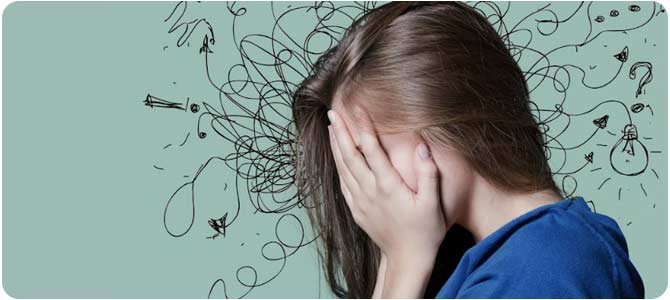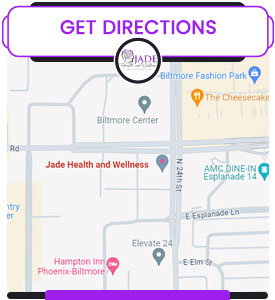ADHD in Adults Q&A
At Jade Health and Wellness, our team specializes in therapy for ADHD in adults and ADHD management. Some of the common symptoms of ADHD are poor organizational skills, lack of attention and focus, restlessness, forgetfulness, and extreme impatience. We provide you with the tools and knowledge to best manage your symptoms for an overall better quality of life. Dr. Courtney Gaines, a psychiatric nurse practitioner at Jade Health and Wellness, offers therapy for adults experiencing ADHD. She has considerable experience in the field of behavioral health and a doctorate in Nursing from Idaho University. For more information, contact us today or book an appointment online. We are conveniently located at 2375 East Camelback RD Suite 600 Phoenix, AZ 85016.


Table of Contents:
What are the signs of ADHD in adults?
What happens to undiagnosed ADHD in adults?
What is the first line of treatment for adults with ADHD?
What should adults with ADHD avoid?
Attention-deficit/hyperactivity disorder (ADHD) is a common neurodevelopmental disorder that usually presents during childhood and continues into adulthood. Those with ADHD often have difficulty paying attention, have trouble regulating impulsive behavior, and have high levels of energy that can be challenging to manage.
Considered to be a developmental disorder, ADHD often appears in childhood and continues throughout adulthood. However, the symptoms of ADHD, such as inattentiveness, hyperactivity, and impulsiveness, present differently in adults than they do in children. Adult symptoms tend to be more subtle as sufferers learn to handle them in addition to adult responsibilities.
The following symptoms may be present in an adult with ADHD:
• Careless and/or reckless behavior
• Lack of attention to detail
• Starting new tasks before finishing old ones
• Poor organizational skills
• Inability to focus
• Continually losing or misplacing things
• Forgetfulness often due to lack of paying attention
• Restlessness and fidgetiness
• Difficulty keeping quiet
• Consistently speaking out of turn or interrupting others
• Mood swings
• Poor ability to cope with stress
• High levels of impatience
Adults may experience varying levels of some or all of these symptoms as they continue to age.
Adults with undiagnosed ADHD are at a much higher level of risk of experiencing problems as compared to the general population. They have a much higher rate of experiencing mood disorders (such as depression and anxiety) and often experience intense mood and behavior swings that can lead to poor quality of life.
Those with undiagnosed ADHD may find themselves struggling with:
• Keeping jobs
• Substance abuse
• Managing compulsive habits
• Steering clear of dangerous choices and/or decisions
• Having healthy romantic relationships
• Maintaining friendships
• Poor self-esteem
• Increased rates of accidents
• Taking care of themselves and/or their home environment
• Planning
• Being on time
While ADHD in itself is not a physically debilitating disease, symptoms that are left unmanaged can lead to severe outcomes that affect one’s mental and physical health. A primary care physician or an ADHD specialist will be able to diagnose the condition as well as provide a tailor-made treatment plan to best manage symptoms.
Treatment for ADHD is usually a multifaceted approach that combines medication, education, skills training, and therapy for a comprehensive result. While there is no cure for ADHD, these treatments can help manage the symptoms for an overall better quality of life.
The first step of treatment for adults is often to get them started on a medication. Stimulants, such as methylphenidate or amphetamine, are most commonly prescribed as they have been shown to balance brain chemistry in those suffering from ADHD.
Medication such as atomoxetine and antidepressants may also be prescribed for those who can’t tolerate stimulants. While they tend to work at a slower rate, they often yield fewer side effects for those who are sensitive to stimulants.
The right medication and treatment will vary among individuals which is why it’s important to have a specialist present to help monitor and guide your healthcare journey.
Some patients with ADHD may experience worsening symptoms when they consume certain foods or beverages. These may include
• Refined carbohydrates such as candy, white bread, white rice, chips, soda, etc.
• Caffeinated beverages
• Foods that contain artificial additives
• Products that contain any personal allergens
While limiting or eliminating these products can help some patients, others may not experience any benefit. Your doctor may propose an elimination diet to see if certain foods are elevating your symptoms or if something else is causing these influxes.
At Jade Health and Wellness, we’ll help you manage and control your ADHD symptoms by customizing our treatment plans to best suit your needs. We are dedicated to helping you achieve the highest quality of life, unhindered by your ADHD diagnosis. For more information, contact us today or book an appointment online. We are conveniently located at 2375 East Camelback RD Suite 600 Phoenix, AZ 85016. We serve patients from Phoenix AZ, Scottsdale AZ, Paradise Valley AZ, Alhambra AZ, Tempe AZ, and surrounding areas.


Additional Services You May Need
▸ ADHD/ADD
▸ Anxiety Disorders
▸ Bipolar Disorders
▸ Borderline Personality Disorder
▸ Depression Disorders
▸ Eating Disorder
▸ Grief Therapy
▸ Life Coaching
▸ Men’s Mental Health
▸ Mental Health Therapy
▸ Mood Disorders
▸ OCD Disorders
▸ PTSD Disorders
▸ Panic Disorders
▸ Stress Disorders
▸ Talk Therapy
▸ Women’s Mental Health
▸ Social Phobia


